-
Matt Brown and Mark Slater, writing about music and things. Looks set to be like a cracking little blog.
-
Reviews of Phill Niblock's "Touch Three": drones created by stripping out attack/release/breath sounds from acoustic performers, and then gluing them together. What we're listening to right now, too. (It is better than that description makes it sound).
-
This is, in fact, the most successful rotary encoder code I've found to date.
-
Excellent summary of what happened on the Yaroze – and a quest to track down all the released Yaroze titles.
-
Jason Rohrer's recursive shooter, which I must pick up at some point.
-
"One succeeds because it leverages the player's motivated, explorative, self-driven experience; the other fails because it relies on a hackneyed, disjointed "epic" plotting (told in 3 separate plot-lines via cutscenes) with incongruous settings and 2-dimensional characters. One succeeds because its formal systems directly feed the player's connection to the world and characters; the other fails because its formal systems bear no discernible relationship to the stories the game wants to tell." This is strong stuff from Michael; I am increasingly fed up of the focus on (poorly-told) stories in games.
-
"Know that there are no "accidents" in this game design. Everything you notice about the game, and every subtle interaction that you experience, is intentionally packed with meaning." (Gravitation, still, being my favourite of Rohrer's games, I think).
-
"Crucially, Goodrich entreats the public to note the following: "this change should not directly affect gamers, as it does not fundamentally alter the gameplay." This one statement should cause considerable distress, as it suggests a troubling conclusion about Medal of Honor as a work of public speech.<br />
<br />
To wit: it suggests that the Taliban never had any meaningful representation in the game anyway. If a historically, culturally, and geographically specific enemy can simply be recast in the generic cloth of "opposition," then why was it was called "Taliban" in the first place?<br />
<br />
And if the Afghan war in which the new Medal of Honor is set was one explicitly meant to drive the Taliban from their strongholds in Afghanistan, why should it matter that the game is set in that nation in the present day at all? In short, how was this Medal of Honor title meant to be a game about this war in particular?" This is a marvellous, critical piece of writing from Bogost. -
Nice post on Awk basics – most of which I knew, but the examples are still great, especially those involving variables. The links out to the Hacker News and Reddit threads are also full of good stuff.
-
"It was at that moment that I understood, more fully than ever before, why revolutionaries succeed and then fail. It's because they're switching genres. They take over the country in a third-person (or first person) action game, but then they have to play an RTS to govern the country."
-
"Think about it: These two guys were carrying the gross domestic product of New Zealand or enough for three Beijing Olympics. If economies were for sale, the men could buy Slovakia and Croatia and have plenty left over for Mongolia or Cambodia… These men carrying bonds concealed in the bottom of their luggage also would be the fourth-largest U.S. creditors." Um, wow.
-
"After a stint shuttling back and forth from his farm in upstate New York to LA, where he consulted on a project for Steven Spielberg and EA, Rohrer has now joined the roster of multimedia stars at Tool of North America, which produces high-end commercials and interactive campaigns for the top advertising firms in the nation." Hmm.
-
"What if Ulysses had been written before the construction of Dublin? That is, what if Dublin did not, in fact, precede and inspire Joyce's novel, but the city had, itself, actually been derived from Joyce's book?" Geoff Manaugh expands on a comment he made at Thrilling Wonder Stories; the stuff about 'quipu' is also awesome.
-
"I’ve always been interested in the relationship between gameplay and musical performance. Theres a remarkable structural similarity between certain game systems/mechanics and compositional ones. There is also a risk/reward/challenge aspect that is core to both practices. Anyway, for a short talk I took part in for the Leeds Evolution Festival I wrote a quick augmented chess/draughts app." And the result is a video-processing step-sequencer. Nifty.
-
"It is easy to have fresh bread whenever you want it with only five minutes a day of active effort. Just mix the dough and let it sit for two hours. No kneading needed! Then shape and bake a loaf, and refrigerate the rest to use over the next couple weeks. Yes, weeks! The Master Recipe (below) makes enough dough for many loaves. When you want fresh-baked crusty bread, take some dough, shape it into a loaf, let it rise for about 20 minutes, then bake. Your house will smell like a bakery, and your family and friends will love you for it."
-
"Explore London on foot with our suggestions for some great capital walks, including riverside rambles, architectural adventures, even the odd pub crawl." A useful page to bookmark.
-
"I think in films, zombies are cyclical. They come around, they get reinvigorated. I think in games, they're a constant. In games, zombies just represent this thing around which you can construct a game. There's no morality to them. There's no worries about racism that games are having right now. If it's a zombie and it's a pure zombie, a stupid zombie like the ones we have, they're a game mechanic. They're fodder, they're whatever you want to put in a game, however you want to deal with it."
-
"This is John Connor, leader of the Human Resistance… Microsoft’s Project Natal must never be completed, no matter what the cost. This machine, with its RGB camera, depth sensor, multi-array microphone, and custom processor running proprietary software, as well as its ability to track up to four human users for motion analysis, is clearly the precursor the killing machines of the near-future that haunt my dreams every night."
-
Jason Rohrer has a new puzzle game out, designed primarily for iPhone but also available for OSX/Windows/Linux as ever. The UI is very thoughtful, for something finger-driven; the game mechanic is complex, but I think I'll get a handl eon it soon. I hope.
-
"As I watched the gunfire on screen, I should have been wondering what it was like to actually be in the shoes of those soldiers. But as I sat staring, I instead wondered whether the Marines had bothered to observe that building for civilian inhabitants before demolishing it. I wondered how any Marine that got shot in Iraq could endorse a game based on Fallujah where you can be hit by a hail of bullets and walk away. By the end, I was left wondering what Konami was thinking." A strong article from Nick Breckon on the problems already showing with Six Days In Fallujah. Thoughtful, well-reasoned, and not at all knee-jerk. I, too, am already concerned.
-
Lovely: Creature Comforts meets "Hey There Little Fella". Totally charming.
-
Ocean Quigley has a blog, and whilst all the stuff on Spore and Sim City 4 is super-nice, what I really like are his paintings and sketches, which are just lovely.
-
"Daily deep-dive analysis of a specimen from the modern world's most exciting communication medium for penis humor."
Favourite Games of 2008
24 December 2008
It’s the end of the year, and that means time for lists. My books and albums lists are forthcoming – hopefully tonight or tomorrow – but in the meantime, I thought I’d kick off with ten of my favourite games of the past year.
There’s lots missing here, mainly owing to the fact I haven’t finished a lot of recent titles or given them the time they’ve deserved. What this is, though, is a good summary of what the gaming year felt like to me; ten games I enjoyed a great deal, and that I would recommend in a heartbeat to anyone not sure where to begin with 2008.
And so, in no particular order:
Far Cry 2
(Xbox 360, PS3, PC)
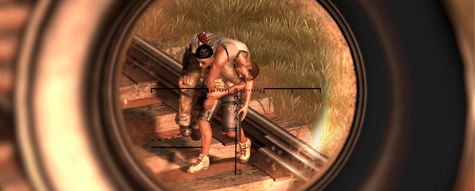
I have written enough about this already, but suffice to say: it sunk its teeth into me, after the initial hump I couldn’t play anything else, and at the end, it left me unable to play anything else for a while. Spectacularly beautiful, too.
Trism
(iPhone)
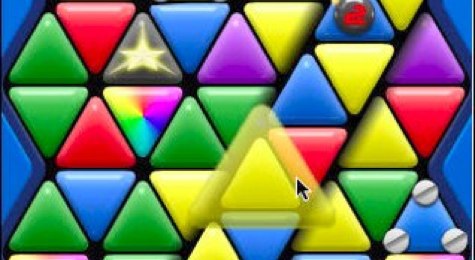
Trism began as an app for the jailbroken iPhone; it quickly made the transition to the official App Store platform when that opened up, and it has sold hundreds of thousands of dollars of copies since then, giving Demiforce a fantastic start to their company. And with good reason: it’s a great piece of game design, easy to learn, and hard to master. It also makes brilliant use of not only the iPhone’s capacitive touch screen, but also its tilt sensor. It’s a very pure puzzling experience, and I’ve already sunk many hours into it; it suits the pick-up/put-down rhythm of travel and play on-the-move idaelly. If you have an iPhone or iPod touch, this really is a no-brainer.
Geometry Wars Retro Evolved 2
(Xbox 360)

It’s still one of the best games on Live Arcade. It’s also still one of the best asynchronous multiplayer games you can play. Making your friends high scores the default high score table gives it a great competitive streak and really contextualises your performance: nothing’s more frustrating than having emailed a friend to say “hah, beat your high score” only to receive an response five minutes later informing you that the ball is firmly back in your court.
Adding variety to the original formula are the six game modes, slowly unlocked over time. They may all be variants on a theme, but they all still demand unique skills and become games in their own right: turning the Pacifism achievement from the first game into a mode in its own right was a great move.
Beautiful in high-def, easily explained to anyone who’s played a videogame in their life, it’s by turns accessible and challenging, and an essential purchase for new 360 players. Also, its social scoreboards give it great longevity, and prove what I already know: I’m nearly, but not quite, at the bottom of the pack when it comes to motor control. As long as I’m not last…
Braid
(Xbox 360)
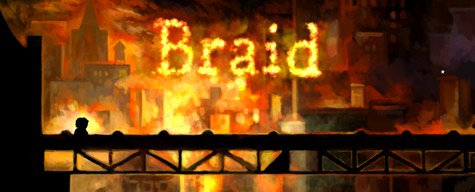
If there’s a measures of Braid’s success, it’s not to be found in its sales or metacritic scores, but in the sheer volume of verbiage devoted to it in the blogs, forums, and magazines of the gaming world. Thousands of words, all expended on the game, on the hype, and on what the hell it all means.
It wouldn’t have got that discussion if it wasn’t in some way good, and it really is: beautiful, challenging, and proof of the things that only games can do. It embraces game-native storytelling, wrapping its meaning tightly around its mechanics, and tells its tale through challenging, timeless puzzles and David Hellman‘s incredible artwork.
Perhaps it is a little pretentious; perhaps the writing is weak. Regardless of those facts, it’s exciting to see a game like this getting such a major launch on a mainstream, living-room platform, and as an artefact to push forward the casual – as well as professional – criticism of games, it’s a great starting point.
GRID
(Xbox 360, PS3, PC)

I always forget how much I like racing games. GRID is a very, very fine take on the racer. It’s beautiful, it’s fast, and it’s totally stripped down. GRID demonstrated that Codemasters really understood what making a game “cinematic” might look like: you condense it down into tight, exciting drama. So races take place over two-to-five laps, and in that time the AI will give you as good a catfight as any “realistic” simulator might over an hour. The rewind-time mechanic, as well as being wonderful to watch, removes the traditional racing-game reliance on the “restart” option; giving the game a pre-credits race, not to mention an ongoing narrative of running a team only helps with the Days of Thunder feel. Mapping Le Mans to a twenty-four minute endurance race makes it both exciting and endurable.
And, of course, it’s very pretty and fast as hell. The open-wheel racing is some of the most exciting driving games have to offer, in particular. The drift tournaments are weak, but stick to the touring cars, touge and open-wheel and you’ve got a hell of a game. The icing on the cake is the beautiful, free-floating typography. Solid, and surprisingly good.
Grand Theft Auto IV
(Xbox 360, PS3, PC)
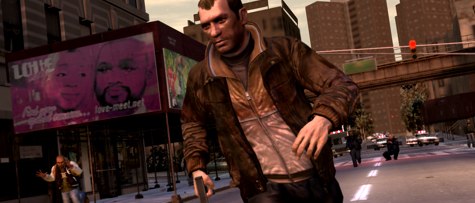
It’s on everybody else’s list, and I can’t really deny it: it’s a wonderful environment, and a staggering achievement. It’s not as smart as it likes, and it occasionally misfires but it delivers moments by the dozen. Shame the pacing of the islands feels wrong – after the majesty of Three Leaf Clover, being dumped in the New Jersey analogue is a bit underwhelming.
Also: multiplayer, with the right gang of people, is a total hoot. Whilst not the runaway online success that might have been hoped for, if you can get eight to sixteen friends online together, Cops and Crooks or Turf War will bring the fun pretty fast.
God of War: Chains of Olympus
(PSP)
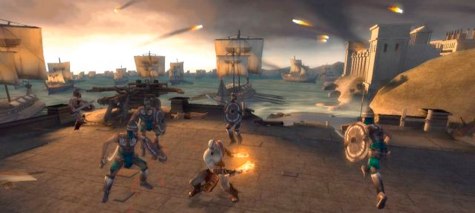
Well, it came out this year in the UK. I played this sitting by a roaring log fire, having spent my days clambering around the Lake District. It is not the greatest game of the year by a long stretch. It is, however, a wonderfully crafted experience: short it may be, but it’s put together almost perfectly: fantastic environments that barely repeat, thrilling combat that’s not too difficult, and one of the most striking in-game sequences I’ve played this year. It helps that the lack of direct camera control translates perfectly to the single-stick PSP. On top of all that, it looks almost as good as the PS2 versions – it’s a remarkable feat of engineering. I had a lot of fun with this, and if you own Sony’s much-unloved portable, you owe yourself to play this.
Left 4 Dead
(Xbox 360, PC)
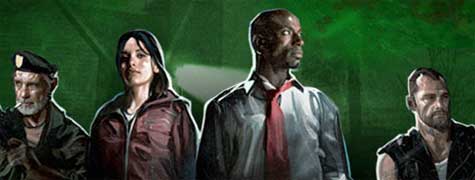
Gerard Way asked if it was any good, and the answer is yes, Gerard, it is. It’s bloody brilliant, although with the obvious caveat that it gets better with friends. Co-op gaming has slowly seen a slew of support and innovation in the past two to three years, and Left 4 Dead represents one particular pinnacle of that: an experience designed ground-up to be played not only co-operatively, but with real friends.
It’s not about team-mates, it’s about mates; how far would you go to save your friends from a Smoker? Quite far, as it turns out; I’ve noticed that in various pick-up groups, if I have to pick between someone I know in real life and someone I don’t, I’ll go with my friends first. To see such an unashamedly co-op experience – and one that could be described as reasonably hardcore if you hadn’t tried it – achieve such a level of mainstream success is very heartening. I put it down to the fact that Valve are such a talented gang of people, and so fastidious in their process. If you’ve not played through the director’s commentary, you owe it to yourself to do so, if only to understand that nothing in the final product is the result of chance.
Also: it’s great to see a game that puts the mechanic, indeed, the core technology, that really makes it – the AI – so far front-and-center. Personifying it as the AI Director was the stroke of genius that not only made players aware of it, but gave them someone to blame when they all died. Again.
World of Goo
(Mac, PC, Wii)
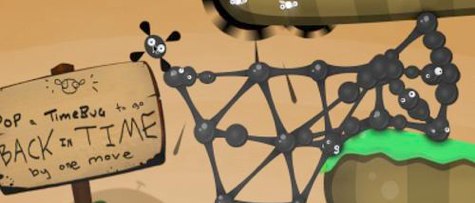
There are two reasons, I think, that World of Goo has captured a lot of people’s hearts this year. One is the game itself: the wonderful art; the delightful soundtrack; the just-one-more-go gameplay that carefully teaches you everything to know whilst keeping the challenge just high enough. But the other is the game’s mythology: 2D Boy, two guys working out of coffee shops for a year, giving up on the traditional industry to make the game they really wanted to. It’s the story we all wanted to believe in. The fact that both elements are so great is the real magic of World of Goo: risking it all, living the indie dream, really did lead to a wonderful game.
Gravitation
(Mac, PC, Linux)
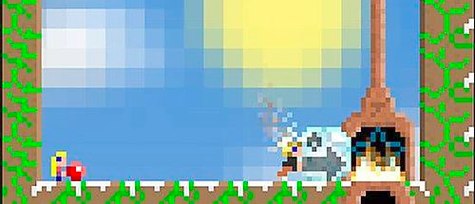
I like this more than Rohrer’s previous Passage. It’s a small, simple game, available for most home desktop platforms (Windows/OSX/Linux), about “mania, melancholia, and the creative process”. To say any more is to rob it of its impact. Once I worked out what you have to do to progress, I played on with a huge lump in my throat. To be heartbroken by a game this slight, this simple, in its 100 square pixel area, is quite something, and Rohrer makes games like no-one else.
-
"I still consider glass to be an extreme craft – you’re working with and fighting gravity and momentum in those 60 seconds before it starts to harden – but you learn to take your time, even if there are lots of moments of extreme concentration to keep a piece from disintegrating." Chris writes up his glass-blowing course; sounds great.
-
"Perhaps the problem is that we so deeply rely on reference points like film, which require stories progressing over time, when we could be referring to things like sculpture or painting, which require no timescale and people find just as moving." Some good thoughts from Jonathan Blow; I think his point about games' unique ability to challenge is an important one.
-
"Rohrer is trying to make art in a medium that most people don't even think is capable of art. He can create this space of pure freedom, as artists have done in the past — isolation, introspection, ascetic poverty. But ultimately he has to send these works out into the world, and people have to respond to them. And right now the audience doesn't know what to do with them." Fantastic writing from Esquire; mature, sensible, and at no point apologist.
-
"The 'better sequel' mentality is damaging both to the games industry and to the quality of games journalism. It is a deferral of critical responsibility, a patronising pat on the head for the developer who dared to dream and fell short in some mythically vital way. I don't want to be frustrated by dodgy controls either, but then I'm willing to blunder through if I'm going to get an experience I never had before." And this is why I've been sticking with it; I think Keith is on the right lines with this quotation.
-
I really like the dot/tab/pad/board delineation, and the fraction/inch/foot/yard scale that accompanies it. A nice way of framing these issues.
-
"Someday I hope game designers really are seen as trusted personal trainers, and that we have the chance to take people through proven processes that pay off in the long run. More gamesight, a surprising social safety net and support system, a more engaging environment, a higher quality of life." You trust a good designer to deliver good experience, regardless of the pain they put you through.
-
"Unknown games are always the best ones… They are always stronger, funnier, cleverer and better-executed than their realities and so that walk home from the store, when the game is tangible in your hands but still imagined in your mind, is oftentimes the most potent moment in the videogame experience." A lovely piece from Simon on what the end of a certain kind of retail experience will really mean.
-
"Steve Rose notes that the recent films have seen Bond visit and destroy as much villain-architecture as ever ("The villains are the creators; Bond is the destroyer. He's basically an enemy of architecture"), and suggests this can be traced back to Fleming's difficulties with Modernist architects." Rod on Bond is always good, and bonus points for the punning title.
-
"A series looking at different aspects of guardian.co.uk's rebuild and redesign project, which ran from October 2005 to September 2008." Looks like there's going to be some good stuff emerging from this; great to see the Guardian making it so public.
-
Jolly good interview with Stephen Cakebread and Craig Howard from Bizarre Creations about the evolution of the Geometry Wars series. In a nutshell: simple games, simply made, and then honed to perfection, or as near as you can get. It's the honing that's important
-
"Somewhere, across whatever barriers stand between, is an other." Jason Rohrer's new game is for two.
-
"A 200-year-old church building has disappeared from a village in central Russia, officials from the Russian Orthodox Church say… It was intact in July but some time in early October thieves made off with it brick by brick." Um.